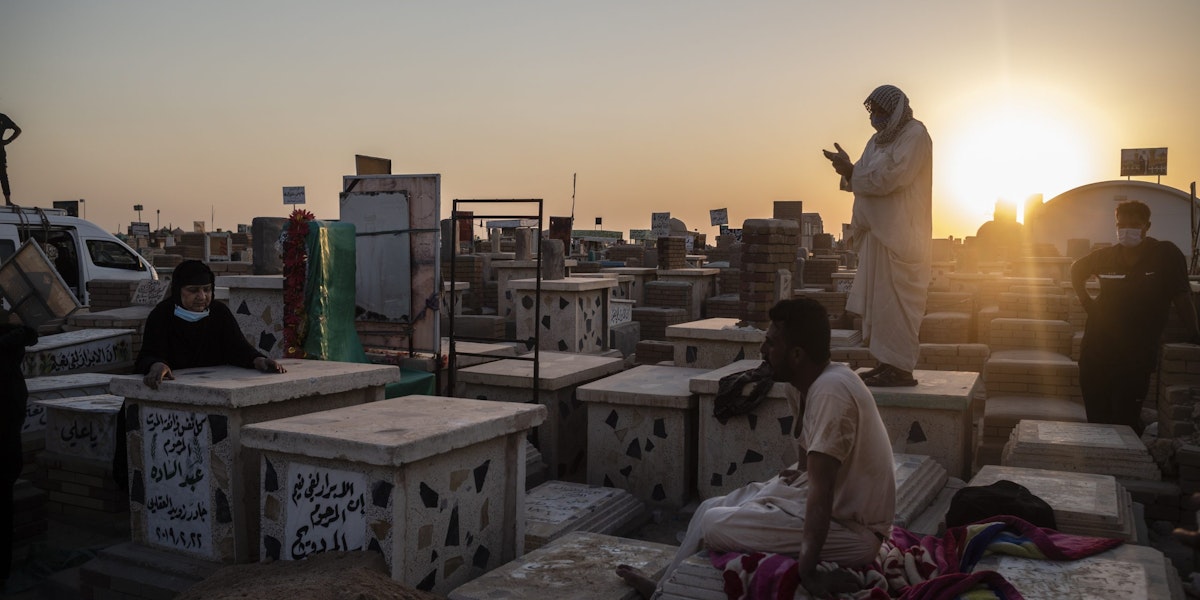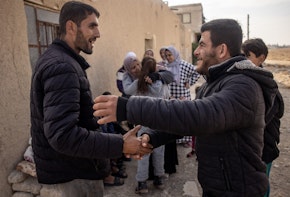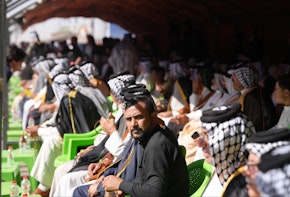Iraq is currently teetering on the edge of collapse. Its economy is struggling, the country is reeling from the COVID-19 pandemic, and the Islamic State and paramilitary groups continue to pose security challenges. Tensions between Iran and the United States play out on Iraqi territory unabated.
Iraqis are grimly familiar with this condition of managed instability, edging toward total state failure—since the U.S. invasion of 2003, it has been more common than peace and security. The world has also grown used to Iraq’s problems, not to mention weary of responding to them. As new alliances and priorities settle into place in the coming months and years, it will be tempting for the United States to simply neglect Iraq. But to do so would be a mistake. Time and again, Iraq has shown that crises born there never stay within its borders.
Other countries, such as Saudi Arabia, have used hard borders and minimized interaction with Iraq to try to quarantine its instability. This strategy has had mixed success, at best, in stopping Iraq’s problems from spilling over. Violent jihadist movements such as the Islamic State first gained a foothold in Iraq, and then proliferated around the region. And Iraq has pioneered a predatory system of hybrid state–militia rule that could be duplicated in Yemen, Syria, and Libya.
Iraq has a set of ingredients that drive instability: a pluralistic but flawed democracy, confessional and ethnic tensions, and dozens of militias and sub-state actors. These factors are the basis for domestic upheaval, but they also make Iraq an exporter of instability beyond its borders, even to countries that have limited relations with it or appear to be distanced enough to not be directly affected. These countries are susceptible because they share some of the domestic factors of instability that Iraq has—such as a multiconfessional society and tensions between autocracy and democracy—which events in Iraq can ignite into an active crisis.
Of course, though Iraq has some traits that predispose it to certain problems, many of its issues are themselves the result of foreign powers’ toxic policies. Since 2003, most Arab states have not only tried to contain Iraq’s chaos, but have also suffocated political evolution in the country when the region’s autocrats found it threatening. These other states, along with Iran and Turkey, have meanwhile turned Iraq into a chessboard to pursue their various aspirations—constantly undermining any progress the country makes toward stability.
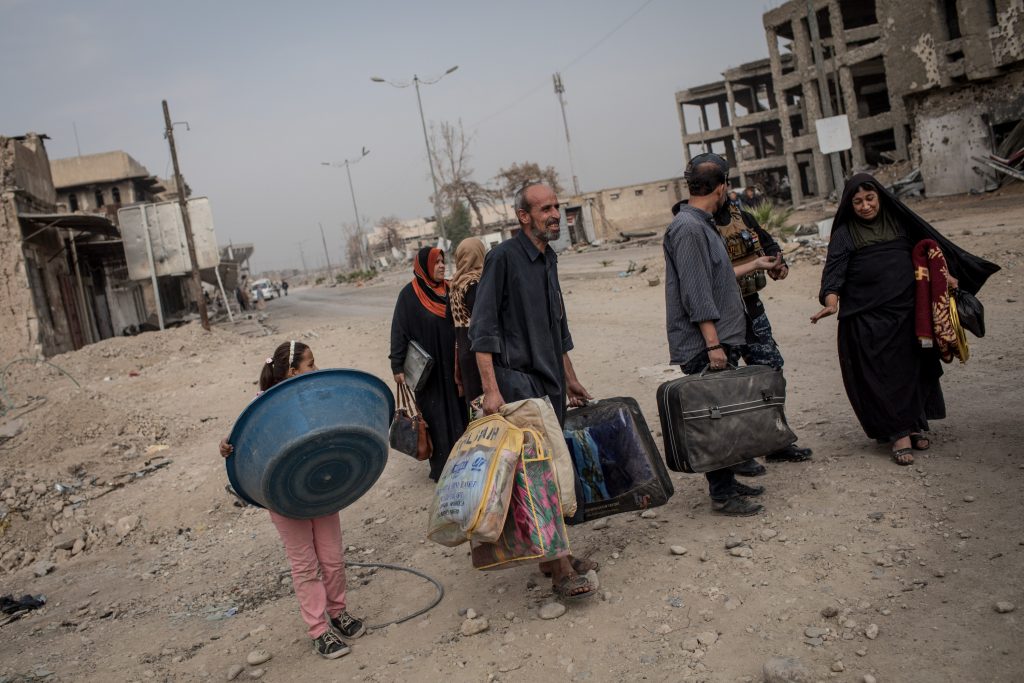
Clearly, the approaches of foreign powers to Iraq have failed. They have neither stopped Iraq’s problems nor contained them. The bordering countries, and more distant players like the United States and NATO, all face unacknowledged realities: that Iraq’s security problems continue to rebound on the wider world; that Iraq is a driver of regional instability as well as an object of intervention; that Iraq has wealth and influence, despite its dysfunction; and finally, that Iraq’s political system is unique in the region and represents both a threat and an attractive alternative to dictatorship and monarchy. Constant intervention does not produce positive results.
Clearly, the approaches of foreign powers to Iraq have failed. They have neither stopped Iraq’s problems nor contained them.
If Iraq proceeds on its current trajectory toward collapse, the fragmentation of state authority will be irreversible—and the poisonous consequences will not be limited to Iraq. Recent history shows that Iraq is inextricably connected to its neighbors, to regional powers, and to intervening powers much farther afield. It is easy to ignore Iraq’s crises until they suddenly spill out into the wider world, as happened in 2014 when the Islamic State took over Mosul and declared a caliphate. Iraq matters, and will continue to matter. Only a sustained investment in responsible state building, by Iraqi factions and by the plethora of foreign governments with a stake, has a chance at saving Iraq and the wider world from another cycle of instability.
Threatening a Delicate Balance
The rise of the Islamic State in Iraq drew recruits from across the region and beyond, showing that the links between sectarianism, ideology, terrorism, foreign policy, and Islamism are not localized and cannot be contained. Some of the factors that led to the events of June 2014 are still in play today (for example, poor governance, Islamic State activity in rural areas, and high unemployment). And although the Islamic State may not hold territory as it did before, it is still able to conduct and inspire attacks in Iraq and in other countries.1 A weakened Islamic State might not seem to be the same threat that it was a few years ago, but the root causes of terrorism are still present in the Middle East, and attempting to confine such militancy to Iraq (and Syria) is misguided. Without working with Iraq to tackle these root causes, it is only a matter of time before the Islamic State—or, more likely, a new iteration of the extremist group—becomes more active and again draws in sympathizers from afar. That is why Iraq’s security and stability should be of paramount importance to nearby countries. They cannot afford to let Iraq suffer and expect any effects on the region to be minimal.
Sectarian division is another cross-border issue, though perhaps more driven by politics than actual religious differences. As such, a political settlement in Iraq that avoids marginalization and gives fair representation to all sects will reduce tensions. However, the way such a settlement is achieved is also tied to how sectarian politics are addressed in other countries, as well as the potential for Iraq to have a positive effect. For example, while ethnic competition is largely an internal issue, Iran and Turkey are now competing in northern Iraq through local forces.2 Both of these countries have large Kurdish populations and armed Kurdish opposition groups that operate from Iraq and Syria, and the conflict with these groups is a destabilizing factor for all four countries. Competition involving ethnic and confessional groups that have foreign sponsors invites foreign interference and stretches across vast areas of central and northern Iraq. The Islamic State also preys on these divisions and seeks common cause with local populations that are disgruntled with their treatment, and with sympathizers from other countries who see sectarian agendas at play.
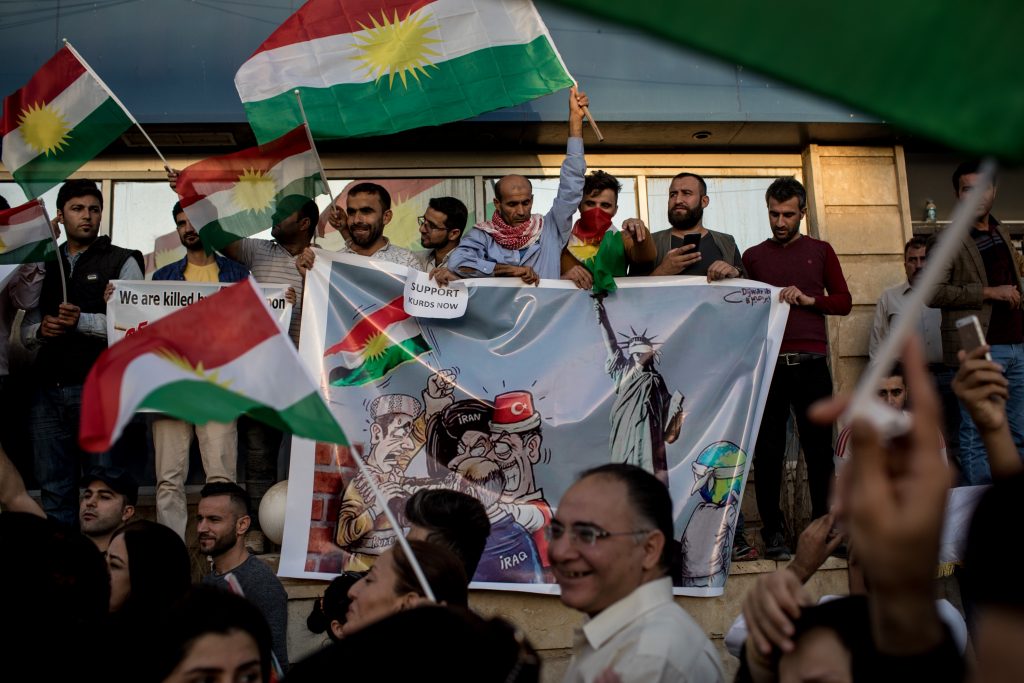
Perhaps the biggest issue affecting stability in Iraq is the role of Iran and Turkey. Both countries see their involvement in Iraq’s affairs as natural and a necessity for their own security. Turkey still occupies parts of Syria and regularly conducts military action in Iraq against the Kurdistan Workers’ Party (the PKK). It has set up bases in Iraqi Kurdistan and is now coming into conflict with the Popular Mobilization Units (al-Hashd al-Sha’abi), who vow to fight “occupation” forces.3 Iran is keen to maintain its influence in Baghdad and deepen economic ties as a way of protecting itself, circumventing pressure from the United States and other countries, and building its network of support across the Middle East. Its support for armed groups that challenge the state brings counteraction from its opponents, who see the proliferation of pro-Iran forces and a weak Iraqi government as a lethal combination for their own security and interests. The resulting proxy conflict and competition charges a cycle of instability. This interference in Iraq’s affairs raises the stakes and opens the potential for conflict.
A challenge for Iraq and other countries in the region is the presence of pro-Iran paramilitary groups such as Asa’ib Ahl al-Haq and Badr, which have political wings, increasing military and financial capabilities, and partners in other countries such as Syria and Lebanon.4 State capture is a real test for governments in Iraq, but the response to these developments is also a test for other nations. There is no purely military solution or policy that can settle this issue definitively. Because of the cross-border nature and capabilities of these groups, it is not possible to ignore or isolate them, relegating the matter as something internal for Iraq to deal with. Countries farther away, such as Egypt, may not feel this issue is immediately relevant to them. But when considering the potential for a conflict to be set off by these groups involving Egypt’s allies or rivals, such as in Lebanon or Yemen, it becomes clearer how much closer the issue is to home. Thus, a stable, secure Iraq in which the state is fully in control of arms and prevents conflict and competition on its territory should be a priority for everyone else in the Middle East. And the converse of a failing and war-torn Iraq should be considered a real possibility and danger.
Exporting Instability
Instability in Iraq is exported to the region and the world through several different channels. Some are directly related to sources of instability. Sectarian rifts, for example—even if their origins are more political—don’t stay contained in national borders. Instability is also exported in profound ways through knock-on effects, including economic impacts. These knock-on effects also create vicious feedback loops for instability in Iraq.
While Iraq is not an economic power in the Middle East, its oil production contributes a vital part of global supply, which helps regulate prices. Iraq is the second-largest exporter of oil in the Organization of the Petroleum Exporting Countries (OPEC).5 It has been put under much pressure by other OPEC members to limit oil production to agreed quotas, which are meant to prevent oversupply and attendant price decreases.6 Conversely, a large fall in Iraqi oil production levels will have a massive effect on prices and undermine OPEC policy and coordination. If the Islamic State or other groups gain control of oil fields, they can use funds from smuggling to expand their activities and further undermine stability. These risks are tied in a complicated web with other issues at the core of Iraqi stability. Iraq is currently struggling with budget deficits. A sustained fall in oil prices would drive the country to insolvency, and with most of the population dependent on public sector employment, the economic situation is deeply consequential for the country. Thus, maintaining the state’s control of the Iraqi economy and preventing its collapse is important domestically—but also globally.
The lack of economic opportunities has been a key driver of protests in Iraq, and the challenges of a young, growing population will contribute to further discontent, absent significant reforms.
The lack of economic opportunities has been a key driver of protests in Iraq, and the challenges of a young, growing population will contribute to further discontent, absent significant reforms.7 Violent repression of protests has so far protected the political order, at the cost of legitimacy. But there is still much risk that anger boils over and leads to the collapse of the state in its current form. Such a collapse may encourage similar movements in other countries, especially those struggling economically that have young populations desperate for change. Conversely, if the Iraqi government succeeds in containing the protests by repressing them, it will signal to autocratic regimes that survival is possible and lead to the further regression of human rights and accountability. In either scenario, Iraq’s instability leads to negative outcomes for others. For Iraq, state collapse also exacerbates the issues listed above, leading to armed conflict and drawing in neighboring states. The nightmare scenario is an Iraq with no functioning government, with dozens of armed groups and ethno-confessional fault lines, and other states competing for their interests and control of territory.
In addition to uncertainty about the survival of the Iraqi state, the nature of Iraq’s democracy is also in question. It is a fledgling, dysfunctional, and inefficient democracy, but is also pluralistic, constitutional, and somewhat representative. These characteristics are antithetical to the authoritarian, undemocratic regimes in the rest of the Middle East. Iraq’s situation thus necessarily raises a predicament for these countries: a successful democratic Iraq could encourage a change in the system of governance elsewhere, but a struggling, unstable Iraq could lead to the outbreak of conflict in the Middle East. Neither option is attractive to the region’s autocracies. They have, therefore, two difficult choices. One is that they can help Iraq become a better democracy while avoiding raising domestic expectations of accountability. Or they can let Iraq flounder (or even push it that way) and allow democracy to fail, while hoping to avoid the negative effects of the resulting chaos.
At the moment, Iraq is in no man’s land. Its social contract is an unsustainable version of the negative aspects of other countries. It has neither true representation and accountability, nor rights and freedoms traded for economic prosperity, security, and stability.8
Considering all these issues, two things become clear. One is that Iraq faces a high risk of increasing instability. The second is that instability in Iraq cannot be contained. Iraq’s failures are a detriment to the entire Middle East. The first casualty, as we have witnessed in the past, is security. Countries close to Iraq, such as Jordan, Syria, Turkey, and Iran, will be acutely affected. The counterargument is that since 2003, despite all that has gone on in Iraq, some countries that neighbor it, such as Saudi Arabia, have not been negatively affected in any significant way. But this counterargument is plainly inaccurate, since Saudi Arabia has failed in its Syria policy, is still fighting a war in Yemen, and has suffered attacks on its energy facilities and infrastructure. Further, thousands of Saudis joined the Islamic State, and some returned to conduct attacks at home.9 All these issues are linked to Iraq in some way—Iraq has the potential to be even more destabilizing for other states than it has been in the past, whether they are actively involved in the country or trying to keep a safe distance.
The smart approach to promoting stability in Iraq (at least for its neighbors’ self-interest) is to seek political, economic, and security cooperation that maintains respect for sovereignty and avoids a negative quid pro quo. Some issues that undermine stability, such as a lack of rule of law, can only be resolved by Iraq itself. But some issues require other countries to come to an understanding that gives the Iraqi state a chance to govern properly. While there are groups in Iraq that are focused on challenging other governments in the region and carry a “revolutionary” or “resistance” mindset, the Iraqi people are generally keen just to have good, solid relations with other countries.10 The Iraqi government itself is not attempting to export democracy, chaos, or any ideological position. Regional countries need not be so nervous that they will be forced to adopt Iraq’s democratic advancements. Understanding this fact is a base from which foreign policymakers can start, building on the desire of people to connect with each other and agree on projects that are of mutual benefit, especially economic ones that the entire region needs.
Engaging Iraq for American Interests
For the United States, the mention of Iraq brings up memories of trauma, chaos, and mismanagement, but most of all, exhaustion with a country that it cannot leave in the past. While the United States has realized that it cannot resolve Iraq’s problems, it also knows that it cannot fully dissociate from events in Iraq.11 Washington has a clear strategic interest in Iraqi security and stability. The United States’ unique partnership with Iraq, and Iraq’s unique pluralistic and republican system of government, are also strategic assets for the United States.
The United States should continue its steady commitment to a partnership with Iraq—a partnership that provides a unique model for how the United States can pursue stability and project power in the region. The ongoing U.S.–Iraq Strategic Dialogue is a good venue to hold serious conversations on how the future relationship between both countries should look.12 First, the relationship must be consensual; America is in Iraq at the sovereign government’s invitation. Second, the relationship must not be purely a military partnership. Third, Iraq and the United States share an interest in the success of a pluralistic quasi-democratic Iraqi state—an experiment that is currently threatened. Fourth, Washington and the Middle East benefit from a region with less violent conflict and less foreign intervention—which requires creating an equilibrium in which domestic and foreign parties can pursue their interests through politics and economics rather than warfare.
The United States should continue its steady commitment to a partnership with Iraq—a partnership that provides a unique model for pursuing stability and projecting power in the region.
The urgency for the United States to stay engaged goes beyond the need to prevent unchecked interventions by Iraqi militias and the meddling governments of neighboring countries. It is also a constructive imperative: Americans benefit, just as Iraqis do, if Iraq can develop a state that governs well enough to forestall another iteration of the Islamic State and to serve as a model for nonviolent resolution of communal disputes.
Iraq’s Enduring Potential
Some of the same factors that drive instability in Iraq are simultaneously the source of its potential—and the reason it still commands attention and competition. At the heart of Iraq’s problems is bad governance, which breeds corruption, insecurity, marginalization, and poor rule of law. If the Iraqi state, currently dominated by the kleptocratic ruling elite, can be pressured, coaxed, and pushed into reform by improving its governance, there is a pathway for the country to realize its potential for stability and democracy. But on the current trajectory, despite attempts to maintain the status quo and forestall any major reforms, Iraq’s political parties face a collapse of the state. Accepting the need for reform, willingly or not, is the first step toward progress. For now, that step is the hardest, and it may be that state collapse is what forces the issue rather than any preemptive action. In either case, Iraq has the resources to recover if allowed to prosper by internal and external entrenched interests.
Perhaps Iraq’s greatest resource is its diverse, heterogeneous population, which allows it to connect not only to Arab nations, but also to Turkey and Iran. Iraq has sizable ethno-confessional communities—Kurdish, Turkmen, Assyrian, Yazidi, Shabak, Sabean, Kakai, Armenian, and others—each of which has further subdivisions and historic cross-border roots that are much older than the modern state. The majority of the population is under thirty years old, with little memory of life before 2003, and is desperate to see Iraq catch up with other countries in the region.13 Iraq’s population is expanding at a brisk pace of 2.3 percent a year (among the highest rates in the Middle East), with expected growth of 17 million between 2015 and 2030 alone.14 This combination of diversity and youth can create a model of minority rights, proper representation, and opportunity in the region—if properly harnessed.
Since the territorial defeat of the Islamic State, Iraqis have also shown that they abhor such extremism and that peaceful coexistence among different communities is possible.
Since the 2003 invasion, Iraq has struggled with sectarianism, terrorism, radicalized Islamism, and ideology-based militancy. These struggles led to war and displacement, and triggered a broader wave of sectarianism across the region. However, since the territorial defeat of the Islamic State, Iraqis have also shown that they abhor such extremism and that peaceful coexistence among different communities is possible. Preventing a resurgence of the Islamic State or similar groups will give Iraq a boost and show that conservative Muslim societies can effectively prevent extremism.
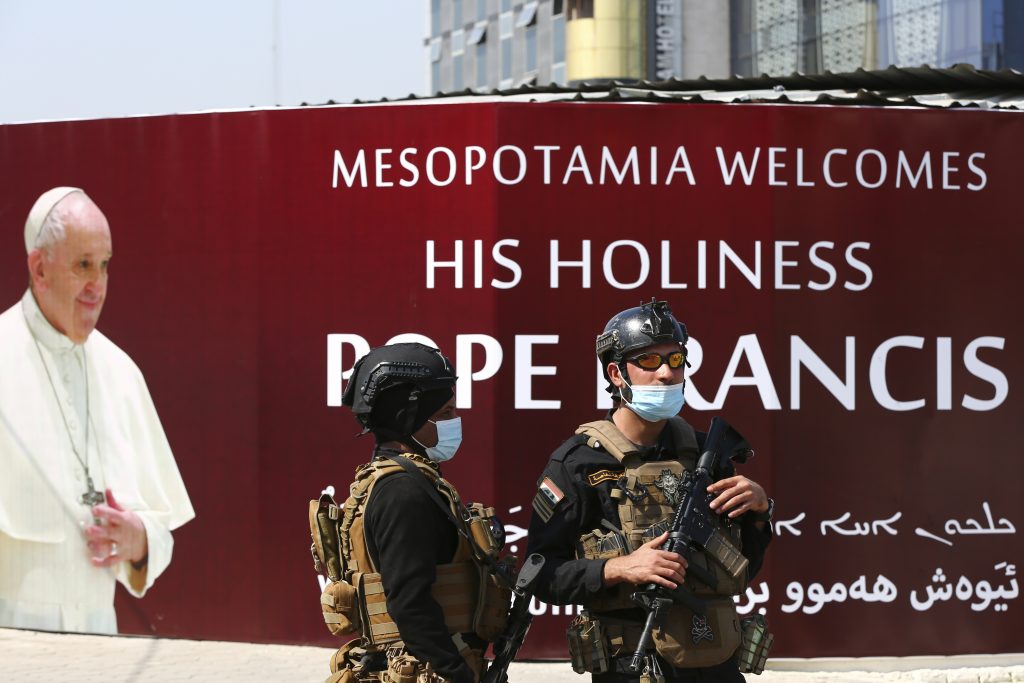
The recent visit of Pope Francis to Iraq, in difficult circumstances, highlights the country’s importance to Christianity but also to other religions.15 “We reaffirm our conviction that fraternity is more durable than fratricide, that hope is more powerful than hatred, that peace is more powerful than war,” said the pope in a speech in Mosul during his visit.16 This message of peace and tolerance, and similar messages that the pope expressed in his meeting with Ayatollah Ali al-Sistani and in Ur and Erbil, should be seized upon by Iraqis to place Iraq at the top of countries with religious freedoms in the Middle East. The pope’s visit should encourage interreligious ties, and Iraqi leaders would do well to heed his words.
Despite the massive flaws in its democracy, Iraq is one of very few nations with such a governing system in the Middle East. If it can improve the way it functions, prevent its abuse, and provide good representation and accountability, it can show that there is an alternative to authoritarian regimes in the region. When combined with the permanent defeat of the Islamic State, a successful Muslim-majority democracy will be a welcome standout in an ugly trend toward further authoritarianism since the Arab uprisings of 2011.17
The path of economic progress in Iraq is an important question mark that has a strong bearing on its future. As the world turns toward a post-oil future, the Iraqi economy is in desperate need of diversification. Were it to reduce dependency on oil exports and open up to investment and other sectors, and transition to a digital economy, it could leap ahead of its neighbors and much of the Middle East. This would also help its environmental situation, protecting its natural resources and ensuring it mitigates the worst effects of climate change.
Iraq’s geographic position and good foreign relations—with every neighbor and almost all countries in the region and the world—put it in a unique position. It can use its relationships to bring countries closer to promote stability and act as a conduit and broker for peace talks and de-escalation, especially with Iran and Syria. Were Iraq to fully stabilize and improve its state authority and performance, it would attract stronger diplomatic ties and investment from other countries, which will begin to see Iraq as a partner rather than as a liability. Iraq would have to avoid disrupting relations with any one country, and it would need a carefully managed foreign policy. But such a path is possible.
For Iraq, one thing should always be reaffirmed to its policymakers and leaders: they have agency, and it is their decisions that have the most effect on what happens in their country. If the state fails, it will be because politicians were not brave enough to undertake the necessary reforms. Other stakeholders and intervening powers also need to recognize the perils of state collapse and that it is possible to pull Iraq back from the brink, if there is a collaborative effort that is not based on zero-sum politics. Without such a realization, decision-makers in Iraq and other countries will have to accept instability there as the norm for the future. They will also need to accept that other countries in the region cannot be shielded from that instability.
This report is part of “Transnational Trends in Citizenship: Authoritarianism and the Emerging Global Culture of Resistance,” a TCF project supported by the Carnegie Corporation of New York and the Open Society Foundations.
header photo: Relatives bury a family member who died from COVID-19 at the Wadi al-Salam cemetery on August 30, 2020 in Najaf, Iraq. Source: Hawre Khalid/Getty Images
Notes
- Christina Goldbaum and Eric Schmitt, “In Bid to Boost Its Profile, ISIS Turns to Africa’s Militants,” New York Times, April 7, 2021, https://www.nytimes.com/2021/04/07/world/africa/ISIS-Africa-Mozambique.html.
- Hamidreza Azizi and Vali Golmohammadi, “Are Iran and Turkey on a Collision Course in Iraq?,” National Interest, March 13, 2021, https://nationalinterest.org/feature/are-iran-and-turkey-collision-course-iraq-179902.
- “Interview with secretary general of Asa’ib Ahl al-Haq Shaikh Qais al-Khazali,” Etejah TV YouTube channel, March 30, 2021, https://www.youtube.com/watch?v=fV6N0pPUzD0.
- Fanar Haddad, “Understanding Iraq’s Hashd al-Sha’bi,” The Century Foundation, March 5, 2018, https://tcf.org/content/report/understanding-iraqs-hashd-al-shabi/.
- Anthony Di Paola and Brian Wingfield, “OPEC Target Gets Harder to Reach for Iraq as Oil Exports Jump,” Bloomberg, February 18, 2021, https://www.bloomberg.com/news/articles/2021-02-18/opec-target-gets-harder-to-reach-for-iraq-as-oil-exports-jump.
- “Iraq Production Jumps as OPEC-Plus Pressure Eases,” Iraq Oil Report, March 23, 2021, https://www.iraqoilreport.com/news/iraq-production-jumps-as-opec-plus-pressure-eases-43604/.
- “Economic Drivers of Youth Political Discontent in Iraq: The Voice of Young People in Kurdistan, Baghdad, Basra and Thi-Qar,” Global Partners Governance, October 2020, https://www.gpgovernance.net/publication/economic-drivers-of-youth-political-discontent-in-iraq-the-voice-of-young-people-in-kurdistan-baghdad-basra-and-thi-qar/.
- Mark Furness and Bernhard Trautner, “Reconstituting Social Contracts in Conflict-Affected Mena Countries: Whither Iraq and Libya?,” World Development 135 (November 2020), https://www.sciencedirect.com/science/article/pii/S0305750X20302114.
- Qassim Abdul-Zahra, “Recent Drone Attack On Saudi Royal Palace Launched from Iraq,” Associated Press, February 25, 2021, https://apnews.com/article/yemen-iran-saudi-arabia-riyadh-middle-east-ab3a83c9090c31f772bad7556bd482f1.
- Renad Mansour, “Networks of Power: The Popular Mobilization Forces and the State in Iraq,” Chatham House, February 2021, https://www.chathamhouse.org/sites/default/files/2021-02/2021-02-25-networks-of-power-mansour.pdf.
- Daniel Benaim, “America Should Pay Attention to Iraq—Before It’s Too Late,” December 6, 2019, https://tcf.org/content/report/america-pay-attention-iraq-late/.
- “Joint Statement on the U.S.–Iraq Strategic Dialogue,” U.S. Department of State, April 7, 2021, https://www.state.gov/joint-statement-on-the-u-s-iraq-strategic-dialogue/.
- Sajad Jiyad, “Torn between Two Allies: How Europeans Can Reduce Iraqi Dependence on Iran and the U.S.,” European Council on Foreign Relations, July 28, 2020, https://ecfr.eu/publication/torn_between_two_allies_europeans_can_reduce_iraqi_dependence_on_iran_us/.
- “MENA Generation 2030,” UNICEF, April 2019, https://data.unicef.org/resources/middle-east-north-africa-generation-2030/; “Population Growth (Annual %),” World Bank, https://data.worldbank.org/indicator/SP.POP.GROW?most_recent_value_desc=true.
- Ishaan Tharoor, “The Symbolic Power of the Papal Visit to Iraq,” Washington Post, March 7, 2021, https://www.washingtonpost.com/world/2021/03/08/pope-francis-iraq-visit-symbolic-power/.
- Philip Pullella and Michael Georgy, “‘Peace More Powerful Than War,’ Pope Francis Says in Iraq’s Ruined City of Mosul,” Reuters, March 6, 2021, https://www.reuters.com/article/uk-pope-iraq-idUSKBN2AZ04X.
- Kali Robinson, “The Arab Spring at Ten Years: What’s the Legacy of the Uprisings?,” Council on Foreign Relations, December 3, 2020, https://www.cfr.org/article/arab-spring-ten-years-whats-legacy-uprisings.
